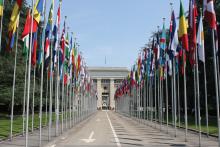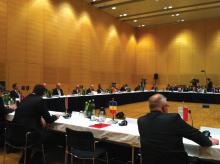IRF Geneva's longstanding partnership with the University of Birmingham has been expanded to form one of the sector’s most comprehensive professional development programmes IRF Geneva offers a rich palette of educational and professional development opportunities and resources. Programmes range from scholarships for master degree studies to the regular organisation of targeted vocational training workshops. A full listing can be accessed via the ‘training & services’ section of the IRF Geneva website (www.i

Birmingham University in the UK has a strong Partnership with IRF geneva
IRF Geneva's longstanding partnership with the University of Birmingham has been expanded to form one of the sector’s most comprehensive professional development programmes
1201 IRF Geneva offers a rich palette of educational and professional development opportunities and resources. Programmes range from scholarships for master degree studies to the regular organisation of targeted vocational training workshops. A full listing can be accessed via the ‘training & services’ section of the IRF Geneva website (www.irfnet.ch).The historic vanguard for these efforts has been IRF’s very fruitful partnership with the 1128 University of Birmingham in the UK.
The university is consistently ranked in the world's top hundred and its Highways Group enjoys an international reputation for its pioneering lead in researching and teaching road management and engineering.
The cornerstone of its association with IRF has traditionally been the renowned Senior Road Executive (SRE) Programme that has now been organised annually for more than fifteen years. Built around a fully integrated interdisciplinary approach, and specially tailored to the needs of senior road executives from emerging economies and developing countries, the programme has contributed immeasurably to advancing global understanding of the most pressing issues facing the road sector. It offers an authoritative, high-level platform for exchanges of experience as well as the latest knowledge and innovation. In this respect, the SRE programme notably provides a prime opportunity for participants to interact with leading experts and fellow executives from all over the world. To facilitate this, the programme is broken down into four intensive, three-day residential modules. Whilst these modules are thematically interlinked, participants not wishing, or not able, to attend them all can select individual components in accordance with their particular needs and priorities. In this and many other ways, the courses are streamlined to suit the needs of practicing professional participants – preserving, nevertheless, the vital residential component that encourages a focused flow and interchange of ideas.
The programme is recognised by the World Bank as well as the UK Department for International Development, and participants attending all four modules further qualify for the prestigious IRF Certificate in Sustainable Road Management. The 2014 edition of the SRE will be held in Birmingham from 23rd June to 5 July 2014 in accordance with the following schedule of modules: Road sector reforms (23-25 June); Road financing (26-28 June); Road maintenance management (30 June-2 July), and Road safety (3-5 July).
The University is now building on the experience and reputation gained from the organisation of the SRE programme to launch three new hands-on courses focusing respectively on Road safety (in collaboration with the international Road Assessment Programme – iRAP), Road economics (in cooperation with HDM Global), and Rural roads for development (with Intech Associates). All three courses are practical five-day intensive residential programmes delivered by leading international experts.
Like the SRE, they are held in state-of-the-art facilities within the university campus and aimed at road sector professionals, engineers, planners and road safety practitioners who want to be exposed to proven, cutting-edge methodologies in their specific fields of specialisation. They have been specifically designed to meet priority industry needs and to optimise the forward career potential of participants.
This course, which runs from 1-5 September 2014, introduces participants to the groundbreaking iRAP (www.irap.org) technology for evaluating the safety impact of road infrastructure.
On completion of the course, participants will have acquired a thorough understanding of the fundamentals of the iRAP-approach to risk assessment and mitigation; the notions of risk mapping and performance tracking; the concept of star rating based on inspection data and road designs, and the principles of developing a safer roads investment Plan.
In these respects and many more, the course reflects IRF Geneva’s commitment, as an active member of the UN Road Safety Collaboration, to improving the safety of roads and vehicles by reference to the ‘five pillars’ of the Global Plan for the UN Decade of Action.
More specifically, by bringing together leading road sector professionals for targeted training, the course aptly complements the work of the IRF Group of Experts on Road Safety aimed at filling a perceived ‘infrastructure gap’ in current global road safety strategies. The course includes practical exercises, discussions and exposure to the dedicated iRAP software.
A key achievement of the University over the years has been that many of the management systems it has developed – notably at the project-to-network and network levels – have been widely recognised and adopted throughout the world. Perhaps the best known of these is the HDM-4, which is operated, of behalf of the World Bank and the World Road Association (3141 PIARC), through the international consortium HDM Global, whose secretariat is in Birmingham.
Now a specialist course, which is scheduled to run from 8-12 September 2014, offers a an introduction to the use of HDM–4 - a de facto world standard for road appraisal - as a decision support tool. It is targeted at road engineers, managers and other road sector professionals who work in the areas of road management, road financing and road maintenance.
By the end of the course, participants will have acquired a solid grasp of the fundamental concepts of the road management cycle, and how HDM-4 can be applied to address key needs. They will also obtain a thorough grounding in the HDM–4 analysis framework and become fully familiar with programme and strategic analysis using HDM-4. Finally, they will learn how HDM-4 integrates with external systems. Besides comprehensive exposure to the system software, the course includes practical exercises and interaction designed to promote the significance of road economics, road financing and the use of appropriate decision support tools.
Targeted at road engineers, managers and other road sector professionals who work in the areas of rural roads, feeder roads, road management, road financing and road maintenance, the course will instil participants with a strategic understanding of the key contribution that rural road development can make to global growth and poverty reduction. Specifically, they will acquire practical grounding in the various methods of pro–poor transport appraisal; rural road design and construction methodologies; appropriate field and laboratory tests for road design and maintenance; the organisation of labour based on intermediate design and construction technologies, and due planning for the potential implications of climate change.
2 External <?xml version="1.0" encoding="utf-16"?><dictionary /> 0 0 0 oLinkExternal www.irfnet.ch Visit IRF Website false http://www.irfnet.ch/ false false %>).
Alternatively, enquires regarding the SRE Programme, can be addressed to [email protected] (Tel: +44 (0)121 414 5137). For the iRAP road safety course and/or the HDM-4 course in Road Management, contact Sarah Williams via %$Linker:2 Email <?xml version="1.0" encoding="utf-16"?><dictionary /> 0 0 0 oLinkEmail [email protected] false mailto:[email protected] true false %> (Tel: +44 (0)121 414 5136). Further details on the Rural Roads for Development course can be obtained from Dean Moody via %$Linker: 2 Email <?xml version="1.0" encoding="utf-16"?><dictionary /> 0 0 0 oLinkEmail [email protected] false mailto:[email protected] true false %> (Tel: +44 (0)121 414 5136).
Partnership for Excellence in Fleet Management
IRF Geneva and Fleet Forum have entered into a three-year agreement to conduct training courses and workshops on Fleet Management
Fleet Forum was formed in 2003 as an interagency association of more than 40 members, including leading non-governmental organisations, UN and other international agencies and corporate partners. It has grown to encompass commercial transport organisations that share concerns about road safety, green practices and fleet efficiency.
Now Fleet Forum is partnering with IRF Geneva to organise a dedicated programme of training courses and workshops.
The content has been specifically developed to provide managers with the latest state-of-the-art tools and knowledge needed to make fleet operations safer, more efficient and more cost effective, as well as to enhance environmental performance and staff safety.
The programme has been customised to the needs of middle and senior level managers serving companies, governmental agencies and departments, humanitarian organisations, NGOs and other relevant bodies. Over the next twelve months, a minimum of twelve training courses and workshops will be convened by the new partnership in a comprehensive range of locations throughout the world – thereby promoting the shared goals of Fleet Forum and IRF to promote road safety and minimise the carbon footprint of fleet operations.
For more information, go to: %$Linker:2 External <?xml version="1.0" encoding="utf-16"?><dictionary /> 0 0 0 oLinkExternal http://fleetforum.org/fleet-excellence-training-corporate Partnership fleet management false http://fleetforum.org/fleet-excellence-training-corporate false false %>
The university is consistently ranked in the world's top hundred and its Highways Group enjoys an international reputation for its pioneering lead in researching and teaching road management and engineering.
The cornerstone of its association with IRF has traditionally been the renowned Senior Road Executive (SRE) Programme that has now been organised annually for more than fifteen years. Built around a fully integrated interdisciplinary approach, and specially tailored to the needs of senior road executives from emerging economies and developing countries, the programme has contributed immeasurably to advancing global understanding of the most pressing issues facing the road sector. It offers an authoritative, high-level platform for exchanges of experience as well as the latest knowledge and innovation. In this respect, the SRE programme notably provides a prime opportunity for participants to interact with leading experts and fellow executives from all over the world. To facilitate this, the programme is broken down into four intensive, three-day residential modules. Whilst these modules are thematically interlinked, participants not wishing, or not able, to attend them all can select individual components in accordance with their particular needs and priorities. In this and many other ways, the courses are streamlined to suit the needs of practicing professional participants – preserving, nevertheless, the vital residential component that encourages a focused flow and interchange of ideas.
The programme is recognised by the World Bank as well as the UK Department for International Development, and participants attending all four modules further qualify for the prestigious IRF Certificate in Sustainable Road Management. The 2014 edition of the SRE will be held in Birmingham from 23rd June to 5 July 2014 in accordance with the following schedule of modules: Road sector reforms (23-25 June); Road financing (26-28 June); Road maintenance management (30 June-2 July), and Road safety (3-5 July).
Branching out
The University is now building on the experience and reputation gained from the organisation of the SRE programme to launch three new hands-on courses focusing respectively on Road safety (in collaboration with the international Road Assessment Programme – iRAP), Road economics (in cooperation with HDM Global), and Rural roads for development (with Intech Associates). All three courses are practical five-day intensive residential programmes delivered by leading international experts.
Like the SRE, they are held in state-of-the-art facilities within the university campus and aimed at road sector professionals, engineers, planners and road safety practitioners who want to be exposed to proven, cutting-edge methodologies in their specific fields of specialisation. They have been specifically designed to meet priority industry needs and to optimise the forward career potential of participants.
iRAP course in Road Safety
This course, which runs from 1-5 September 2014, introduces participants to the groundbreaking iRAP (www.irap.org) technology for evaluating the safety impact of road infrastructure.
On completion of the course, participants will have acquired a thorough understanding of the fundamentals of the iRAP-approach to risk assessment and mitigation; the notions of risk mapping and performance tracking; the concept of star rating based on inspection data and road designs, and the principles of developing a safer roads investment Plan.
In these respects and many more, the course reflects IRF Geneva’s commitment, as an active member of the UN Road Safety Collaboration, to improving the safety of roads and vehicles by reference to the ‘five pillars’ of the Global Plan for the UN Decade of Action.
More specifically, by bringing together leading road sector professionals for targeted training, the course aptly complements the work of the IRF Group of Experts on Road Safety aimed at filling a perceived ‘infrastructure gap’ in current global road safety strategies. The course includes practical exercises, discussions and exposure to the dedicated iRAP software.
HDM-4 course in Road Management
A key achievement of the University over the years has been that many of the management systems it has developed – notably at the project-to-network and network levels – have been widely recognised and adopted throughout the world. Perhaps the best known of these is the HDM-4, which is operated, of behalf of the World Bank and the World Road Association (
Now a specialist course, which is scheduled to run from 8-12 September 2014, offers a an introduction to the use of HDM–4 - a de facto world standard for road appraisal - as a decision support tool. It is targeted at road engineers, managers and other road sector professionals who work in the areas of road management, road financing and road maintenance.
By the end of the course, participants will have acquired a solid grasp of the fundamental concepts of the road management cycle, and how HDM-4 can be applied to address key needs. They will also obtain a thorough grounding in the HDM–4 analysis framework and become fully familiar with programme and strategic analysis using HDM-4. Finally, they will learn how HDM-4 integrates with external systems. Besides comprehensive exposure to the system software, the course includes practical exercises and interaction designed to promote the significance of road economics, road financing and the use of appropriate decision support tools.
Rural roads for development course
Running from 15-19 September 2014, this new course offers a practical introduction to building and maintaining rural roads for development. It will include laboratory sessions designed to demonstrate simple tests that can be used in the field to determine soil properties in the context of appropriate design and maintenance.Targeted at road engineers, managers and other road sector professionals who work in the areas of rural roads, feeder roads, road management, road financing and road maintenance, the course will instil participants with a strategic understanding of the key contribution that rural road development can make to global growth and poverty reduction. Specifically, they will acquire practical grounding in the various methods of pro–poor transport appraisal; rural road design and construction methodologies; appropriate field and laboratory tests for road design and maintenance; the organisation of labour based on intermediate design and construction technologies, and due planning for the potential implications of climate change.
Online information and registration
For further information, or to register online for all or any of the above courses, simply follow the dedicated links from the training & services section of the IRF Geneva website (%$Linker:Alternatively, enquires regarding the SRE Programme, can be addressed to [email protected] (Tel: +44 (0)121 414 5137). For the iRAP road safety course and/or the HDM-4 course in Road Management, contact Sarah Williams via %$Linker:
Partnership for Excellence in Fleet Management
IRF Geneva and Fleet Forum have entered into a three-year agreement to conduct training courses and workshops on Fleet Management
Fleet Forum was formed in 2003 as an interagency association of more than 40 members, including leading non-governmental organisations, UN and other international agencies and corporate partners. It has grown to encompass commercial transport organisations that share concerns about road safety, green practices and fleet efficiency.
Now Fleet Forum is partnering with IRF Geneva to organise a dedicated programme of training courses and workshops.
The content has been specifically developed to provide managers with the latest state-of-the-art tools and knowledge needed to make fleet operations safer, more efficient and more cost effective, as well as to enhance environmental performance and staff safety.
The programme has been customised to the needs of middle and senior level managers serving companies, governmental agencies and departments, humanitarian organisations, NGOs and other relevant bodies. Over the next twelve months, a minimum of twelve training courses and workshops will be convened by the new partnership in a comprehensive range of locations throughout the world – thereby promoting the shared goals of Fleet Forum and IRF to promote road safety and minimise the carbon footprint of fleet operations.
For more information, go to: %$Linker:









